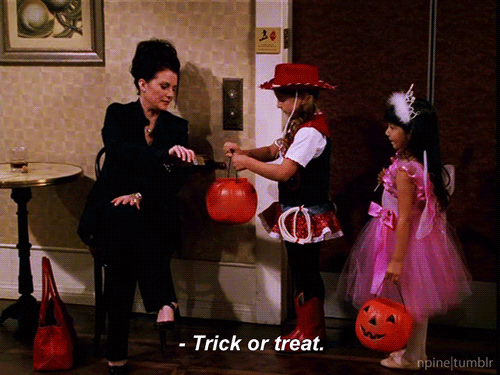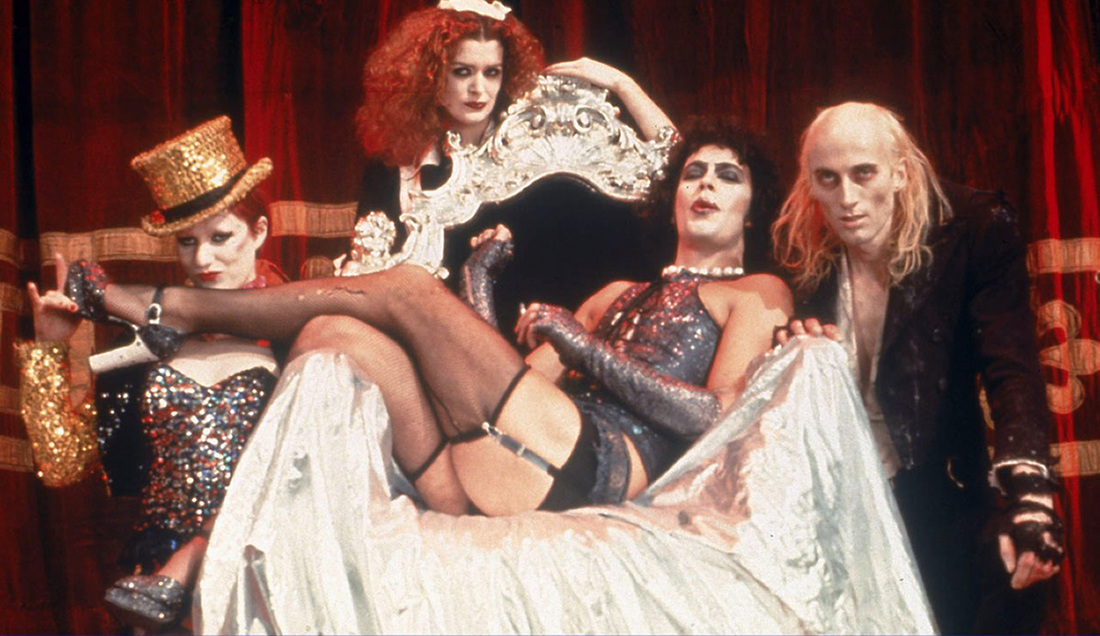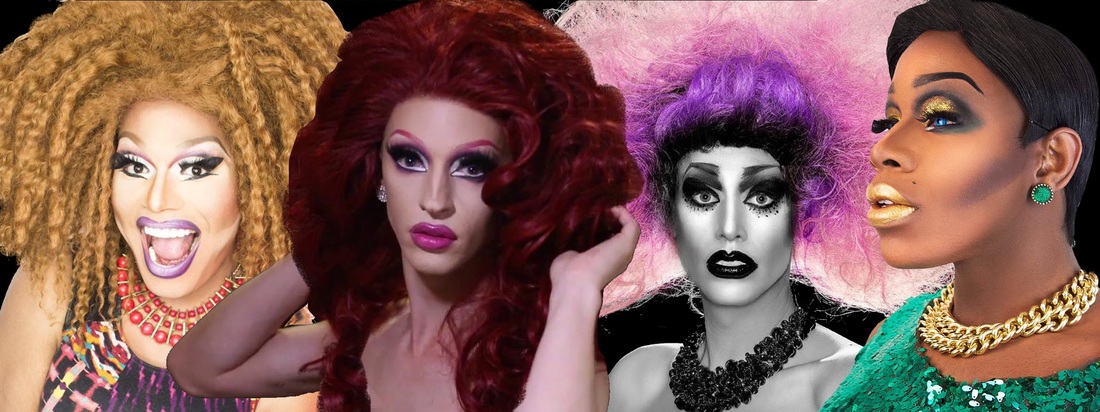|
Catch up with your sassy and spooky favorites this Halloween season on LOGO!
What: Hey, Boo! When: Sunday, October 23 through Monday, October 31 Where: Logo About: Do you wish you could watch your favorite Halloween specials of all your favorite throwback shows? Logo is making your dream a reality! Tune in to watch spooky episodes of Roseanne, Three’s Company, The Golden Girls, Will & Grace, and Bewitched. If that's not enough they will be rotating Buffy the Vampire Slayer, The Ruins, The Stepfather, Dolores Claiborne, and most importantly The Rocky Horror Picture Show.
0 Comments
Catch up with your sassy and spooky favorites this Halloween season on LOGO!
What: Cocktails & Classics: The Rocky Horror Picture Show When: Sunday, October 16 at 8/7c Where: Logo About: Tune into a special showing of The Rocky Horror Picture Show. Michael Urie and guests do the Time Warp again, taking a look back at the mother of all cult classics that follows a couple's encounter with the bizarre Dr. Frank-N-Furter. Film star Barry Bostwick shares exclusive behind the scenes stories. What must a woman endure to become president of the United States?
The office of president has been defined for generations in terms of white, male gender roles. That definition requires someone to live their gender as if they’re members of America’s repository of manhood expectations, the military. “Commander in Chief,” a title applicable only to the president’s role over the military, not the citizenry in general, is now used far beyond the duties of president as leader of the armed forces. Though he’s our president, not our commander, we succumb to its use in acceptance of the expectation that he be a male warrior, for we define ourselves as a warrior state with teamwork defined as a group of men ready to beat, defeat, or kill other men. What this national model does to our young boys is itself inhuman. When my fifth grade son began his first season of football, he hadn’t yet been fully conditioned in masculinity. He came up to me before his first game and said: “Dad. The coach is going to say, ‘kill the other team,’ but he doesn’t really mean it.” This was a new language for a young boy, but over the years he’d learn that that’s how real men think. So, what happens in a woman’s life as she makes her way up through this system to ultimately run for this bastion of manhood? The answer is in many ways captured by that old quip comparing Ginger Rogers to her male cinema dance partner: “She did every step Fred Astaire did, but had to do it backwards and in high heels.” It’s one thing to talk about how our culture takes our whole and complete, caring, loving, nurturing, and fully human little boys and with its dominant male gender role and its accompanying homophobia forces them into a male straight jacket. But to have been born a woman who is never supposed to live this conditioned male role and instead must fit all the feminine stereotypes creates an more heart-wrenching battle for our little girls. Because of laws such as Title IX of the US Education Amendments of 1972, later generations of women have had more opportunities, achieved more in the public sphere, and been able to fight for equal treatment in education than they could in the years a woman who is today 68 years old came through. But the fight is far from over while the backlash against women’s attainments still falls back on tired female gender role expectations. What did a young girl have to experience from the time a fully human baby was born and people needed to know if the baby should have pink or blue blankets? Even the most enlightened parents right after World War II, and many today, treated girls in terms of what’s expected of females who eventually should grow up with, no matter what else they accomplish in the meantime, the goal of getting a man to love and protect them. We know how a woman’s place is installed early through the way boys taunt other boys. As if girls are the worst things in the world, we can still hear: “You walk like a girl. You talk like a girl. You run like a girl. You throw a ball like a girl. You carry your books like a girl. You like girl’s things. You look like a girl. You dress like a girl.” None of this would work if it weren’t an effective childhood criticism against a boy doing only what girls are supposed to do. And the corollary of girls being taught to feel like something less still convinces them that pleasing a man is women’s key to wholeness. A career-oriented woman isn’t complimented in this mainstream as someone who is a natural born leader and go-getter the way a man is. She is seen as out for her own good and might even be subject to lesbian-slurs – “Don’t you like boys?” – that work when a culture looks down on lesbians. And from childhood on, she experiences numerous personal reminders that a girl who rejects the limits of the female gender role endures. For example, when college senior Hillary Clinton was one of the few women in a large Harvard classroom taking her law school admissions test, some men started yelling: “You don’t need to be here.” “There’s plenty else you can do.’” Even: “If you take my spot, I’ll get drafted, and I’ll go to Vietnam, and I'll die.” A woman must steel herself to play above the ubiquitous insults that criticize her for challenging the role and at times bettering males in the process. When a woman is in the public sphere, as she is, it’s easy to make a long list of those we know. Who is surprised when Secretary Clinton concludes: “I know that I can be perceived as aloof or cold or unemotional. But I had to learn as a young woman to control my emotions. And that’s a hard path to walk. Because you need to protect yourself, you need to keep steady, but at the same time you don’t want to seem ‘walled off.’ And sometimes I think I come across more in the ‘walled off’ arena. And if I create that perception, then I take responsibility. I don’t view myself as cold or unemotional. And neither do my friends. And neither does my family. But if that sometimes is the perception I create, then I can’t blame people for thinking that.” We’re approaching what could be a historically monumental moment in American politics that catches the US up with those other nations who’ve already had female chief executives, but we must recognize how difficult it is to do all the dance steps a man does but backwards and in high heels. And as if to rub it in, as she fights for the presidency itself, her opponent is no normal candidate like a Romney or McCain. He’s one who crudely and brashly symbolizes and espouses everything that women have to endure as they negotiate America’s dance. --- Robert N. Minor, Ph.D., Professor Emeritus of Religious Studies at the University of Kansas, is author of When Religion Is an Addiction; Scared Straight: Why It’s So Hard to Accept Gay People and Why It’s So Hard to BeHuman; and Gay & Healthy in a Sick Society. Contact him at www.FairnessProject.org.  Bridget Bishop Presents: The Salem Bitch Trials follows a drag family as they put on a play about the first witch executed during the Salem Witch Trials. As the story unfolds, they lose track of what is history and what is the present reality. As Bridget Bishop lip-syncs her way through Donna Summer's greatest hits, she must reconcile her relationships with her drag daughters, her love interest, and her own identity in and out of drag. With a cast of New York's favorite drag queens, Brita Filter, Monét Xchange, Miz Cracker, and Dusty Ray Bottoms, this play looks to examine performance and identity within the LGBT and drag community. There will be pre-show performances from our queens, as well as wine being served throughout the night. The play hopes to capture the essence of gay nightlife and utilize it in a theatrical setting. The playwright, Jared Rubin Sprowls, is a recent Northwestern University graduate and is incredibly excited about his NYC/Off-Broadway debut with a fellow Northwestern alumnus, Aaron Simon Gross, directing this project. Sprowls wrote this piece in conjunction with his undergraduate Senior Honors Thesis entitled Adapting Drag for Conventional Theatrical Forms. In his research, he looked at the ways in which contemporary drag artists combined genres and mediums to create the exciting work being presented on stage. Drag queens, Sprowls found, are curators of music, media, pop culture, and fashion, and he hoped to write a play that could incorporate these layers of performance as well as the drag artists who have been cast in the play. Similar to Arthur Miller’s well-known play, The Crucible, The Salem Witch Trials were chosen as the backdrop and, subsequently, a larger metaphor for the story. Witches and drag queens seemed to have more similarities than one might intentionally have thought: What do we consider magical and who is able to attain it? As themes tied to sexuality arose, Donna Summer found her way into the story as a surrogate drag mother to our protagonist Bridget Bishop and her death as an impetus for the play itself. What allows these ideas to be put together, and also makes the play unique, is the metatheatricality of the piece, meaning that it is a play within a play. A drag queen blurs the line between what is performance and/or a character and what is authentic or realistic: Sprowls wanted The Bitch Trials to emulate that quintessential drag quality. Bridget Bishop Presents: The Salem Bitch Trials is campy and gaudy while being sincere at its core. It’s only a limited run, October 18th-22nd, so make sure to catch this 90 minutes of drag and drama while you can! Tickets are only $25-$30 and are available at www.thesalembitchtrials.com, where you can also learn more about the project, cast, and crew. Lastly, like the play on Facebook to stay up to date on our special offers and events. History has never been this fierce! |
P&E - After PrintHere are some of the latest articles and topics in the GLBT community. Archives
June 2024
Categories |




 RSS Feed
RSS Feed
